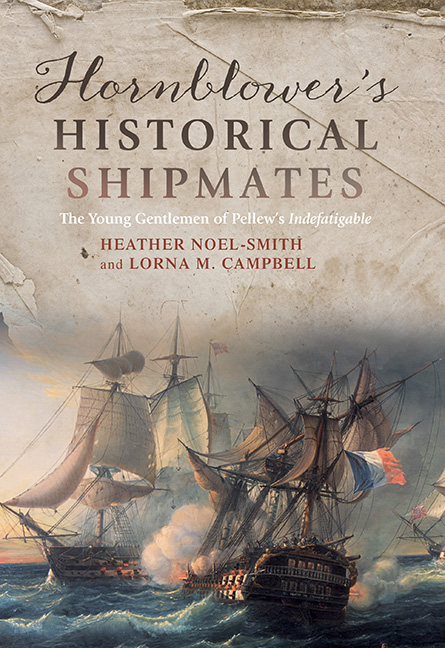Book contents
- Frontmatter
- Dedication
- Contents
- List of Illustrations
- Preface and Acknowledgements
- List of Abbreviations
- Introduction
- 1 Edward Pellew – Partisan and Patriarch
- 2 ‘My Dear Indefatigable’
- 3 The Fortunate Few
- 4 ‘Never Was Such an Action Known’
- 5 The Nature of Patronage
- 6 ‘Boys Grown to Manhood’
- 7 Diversity and Responsibility
- 8 Friends, Family and the Falmouth Connection
- 9 ‘Faithful and Attached Companions’
- 10 ‘No State in Life More Honourable’
- Appendix The Spencer–Pellew Correspondence of February 1799
- Bibliography
- Index
4 - ‘Never Was Such an Action Known’
Published online by Cambridge University Press: 28 April 2017
- Frontmatter
- Dedication
- Contents
- List of Illustrations
- Preface and Acknowledgements
- List of Abbreviations
- Introduction
- 1 Edward Pellew – Partisan and Patriarch
- 2 ‘My Dear Indefatigable’
- 3 The Fortunate Few
- 4 ‘Never Was Such an Action Known’
- 5 The Nature of Patronage
- 6 ‘Boys Grown to Manhood’
- 7 Diversity and Responsibility
- 8 Friends, Family and the Falmouth Connection
- 9 ‘Faithful and Attached Companions’
- 10 ‘No State in Life More Honourable’
- Appendix The Spencer–Pellew Correspondence of February 1799
- Bibliography
- Index
Summary
Pellew's engagement with the Cléopatre in June 1793, at the very outbreak of the war, had already brought him public honours and huge popular acclaim; he was knighted for his services, awarded an annuity from the Privy Purse to cover the expenditure associated with his new title, and feted by the King, George III, the First Lord of the Admiralty, Lord Chatham, and the Prime Minister, William Pitt the Younger. However it is the engagement with the French 74, Les Droits de L'Homme, five years later, that has gone down in history as the most iconic frigate action of the French Revolutionary and Napoleonic Wars, and which sealed Pellew's reputation as the quintessential frigate captain.
Les Droits de L'Homme was one of the remnants of the ill-fated expedition to Ireland, a joint military and naval endeavour that proved to be a resounding disaster for the French, and an embarrassment for the British. The Admiralty had been monitoring the build-up of the French fleet at Brest for months, and although they had sufficient intelligence to know that an expedition of considerable force was imminent, they had no knowledge of the destination. Ireland, Portugal, Gibraltar and England itself were all speculative targets. In order to counteract the threat of invasion, the Admiralty instigated a system of close blockade under the command of Admiral Lord Bridport, Commander in Chief of the Channel Fleet. The main complement of the fleet was based at Spithead under the command of Bridport himself, while a squadron of fifteen sail of the line under Admiral Colpoys was stationed off Ushant. An additional inshore squadron of detached frigates commanded by Pellew in the Indefatigable patrolled the inner reaches of Brest, often peering right into the roads to watch the activity of the fleet at anchor.
The destination of the planned expedition was Ireland, the seeds having been planted in Basel the previous year when Lord Edward Fitzgerald and Arthur O'Conor of the banned republican Society of United Irishmen met with General Hoche to discuss support for their cause.
- Type
- Chapter
- Information
- Hornblower's Historical ShipmatesThe Young Gentlemen of Pellew's <I>Indefatigable</I>, pp. 60 - 78Publisher: Boydell & BrewerPrint publication year: 2016

